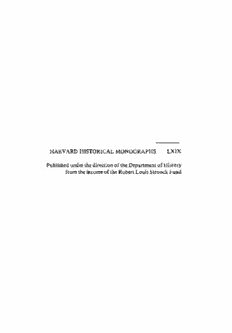
Industry and economic decline in seventeenth-century Venice PDF
Preview Industry and economic decline in seventeenth-century Venice
HARVARD HISTORICAL MONOGRAPHS LXIX Published under the direction of the Department of History from the income of the Robert Louis Stroock Fund .. .il ! . ·-·--·-·- --+----· i " ==='i.e..-=--=-,,,""-'--'""--'----'- ~ ----·· ---~ s ~ J~ J J J -~ Industry and Economic Decline in Seventeenth-Century Venice RICHARD TILDEN RAPP Harvard University Press Cambridge, Massachusetts, and London, England 1976 Copyright © 1976 by the President and Fellows of Harvard College All rights reserved Printed in the United S1a1es of America Library or Congress Cataloging in Publication Data Rapp, Richard T Industry and economic decline in seven1een1h-cen1ury Venice. (Harvard historical monographs; 69) Bibliography: p. Includes index. I. Venice-Economic conditions. I. Tille. II. Series. HC308.V4R36 330.9'45'31 75-16149 ISBN 0-674-44545-7 PREFACE The craft of economic history has undergone a transformation in the recent past. Methods once alien to history have become routine for today's researcher. Historical statistics, formerly used for casual illustration, now form the basis of much investigation. For modern studies this new approach has borne much fruit, yet, surprisingly, early modern economic history has benefited less from the new methodology. It is not easy to understand why this should be. As several historians have shown, data are available, even if difficult to locate and transcribe. Certainly the problems posed by the study of economic change in preindustrial society are worthy of interest. Per haps it is the fear of revisiting grounds already well trodden (a fear which does not daunt historians of the modern era) which has retarded the application of new methods to early modern history. The purpose of this book is to shed new light on one long-studied problem: the decline of Venice. For more than a century historians have striven to understand how and to what extent the city of Venice fell from the heights of com mercial primacy to insignificance. It is one of the most commanding topics in early modern economic history-the supreme case-study of an economy experiencing the very opposite of "development." The problem is, in a sense, undisguised and this enhances its appeal. The economic fortunes of early modern Venice did not swing wildly with exogenous events such as invasions or political upheaval. The Serene Republic, to be sure, had its episodes of piracy, plague, and war, but as serious as they were, they did not alter the course of the secular trend. This is a fact which contemporary Venetians seemed to appreciate very well-a remarkable insight, considering that those "exogenous" events of the seventeenth century were full of drama and portent in the life and history of the city. Still, economic observers viii PREFACE were aware that the effects of the piracy problems early in the century, the plague of 1630-1631, and even the long War of Candia (1645-1669) were transitory. Their reports pay brief, pro forma attention to these problems and then nearly always abandon temptingly simple excuses in recognition of more real and more complex sources of economic difficulty: international competition, failures in productivity, or falling aggregate demand. They saw as we see now that production, consumption, and the level of international trade are the factors that count. In this study I have chosen to concentrate on production, without ignoring commerce and consumption. The response of industry to adverse market conditions is the key to understanding Venice's fight for competitive survival. Instead of reviewing the separate industries of Venice one by one (an impractical but often-used method) I have chosen to focus on the factors common to all manufacturing enterprises: labor supply, capital employment and technology, foreign demand, and the influence of government on industrial activity. A statistical census of employment is the backbone of this inquiry for the reactions of Venice to a threatened commerce can best be revealed by measuring the changing allocation of labor. In this fashion one may study structural change in the economy of seventeenth-century Venice in much the same fashion as change of a more general nature in a modern economy might be analysed. What emerges is not a radical reinterpretation of Venetian history so much as a confirmation of what many scholars have begun to sus pect already: that the catch-all phrase, "the decline of Venice," embodies a myth. I am indebted to the U. S. Government Fulbright-Hays Program and the Kent Fellowship Program of the Danforth Foundation for generously providing me with the resources to conduct two years of uninterrupted research in Venice and the United States. Professor James C. Davis introduced me to the study of Venetian history, and from the very onset of my interest in this subject I have benefited from his constant advice and criticism. I am particularly grateful also to Professor Martin Wolfe for his advice and encouragement throughout the course of this project. Professors William G. Whitney, Richard A. Easterlin, and Stefano ix PREFACE Fenoaltea of the Department of Economics of the University of Pennsylvania were kind enough to read parts of the manuscript and offer valuable suggestions. Generous criticism from Mrs. Florence Edler de Roover, Professor William Bouwsma, and Mrs. Madeleine R. Gleason inspired many late revisions of the text. It was Professor Frederic C. Lane who directed me to guild census materials in Venice which ultimately led to the exploration of the Naval Personnel Administration archive (Milizia da Mar). This repository has provided the most fruitful body of data on the labor .force of Venice. For this and countless other kindnesses I am deeply grateful. The late Professor Raymond de Roover was an unflagging source of guidance to me ever since my introduction to economic history at his. hand. His untimely death in 1972 deprived me of the long-awaited chance to express publicly my thanks to him, and for me this is the most bitter disappointment of the project. I thank the staff of the Archivio di Stato di Venezia for extending to me their traditional combination of helpful assistance and goodwill.
